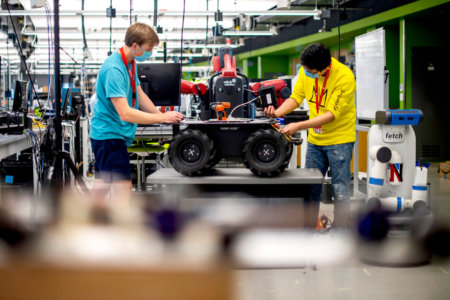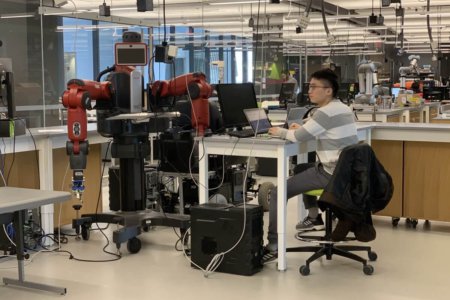Drones autonomously inspect bridges and skyscrapers, reaching places that humans cannot safely. Artificial intelligence and machine learning aid in predicting weather extremes — from hurricanes to earthquakes — to help save lives. Smart technologies optimize transportation systems and roadways in fast-growing urban cities, while floating wind turbines hold promise to power the grid and mitigate climate change. These are just a few of the many ways civil and environmental engineers are transforming the built environment for a new generation of exciting possibilities.
According to the American Society of Civil Engineers (ASCE), demands for sustainable energy, fresh water, clean air, and safe waste disposal are driving infrastructure development on a global scale. Addressing these challenges requires interdisciplinary knowledge and integrating technology, data, science, and policy. You can learn more about the ASCE’s Vision for Civil Engineering here.
Northeastern University College of Engineering, a top ranked, R1 top-tier research university in Boston, Massachusetts, with a global network of campuses, is a leader in civil and environmental engineering education, research, and experiential learning.
The Department of Civil and Environmental Engineering offers a Master of Science in Civil Engineering, and students can delve into their area of interest by selecting from six concentrations. A Master of Science in Environmental Engineering is also offered as is a Doctor of Philosophy degree in Civil and Environmental Engineering and in Interdisciplinary Engineering. Specialized interdisciplinary master’s degrees include the MS in Sustainable Building Systems and the MS in Engineering and Public Policy.
With a constant eye on the emerging needs of industry, Northeastern recently added a concentration in Data and Systems to its civil and environmental engineering portfolio. Artificial intelligence and machine learning open exciting new opportunities for researchers to learn from and leverage data, while the increasing availability of affordable sensors is changing the way cities and the environment are measured and monitored. Buildings, transportation networks, energy utilities, and water resource infrastructure are designed with increasingly complicated smart technology. The curriculum is designed to give the engineers of tomorrow the interdisciplinary knowledge, and technical and analytical skills to build, maintain, and learn from AI and smart systems and the large quantities of data they produce.
Experiential learning and co-op
Aravind Uthaman graduated with a master’s degree in civil engineering with a concentration in structural engineering in 2019. He credits his career as a structural engineer to Northeastern’s emphasis on experiential learning, which began on his first day of orientation.
He worked on the pioneering research that brought his faculty advisor, CDM Smith Professor and Chair Jerome Hajjar, national attention in his field — improving human safety by using drones to inspect bridges. The drones capture high-resolution 3D images of the bridges that are then used to conduct inspections.
“My work with Professor Hajjar helped me sharpen my software skills such as Revit, Tekla, AutoCAD, and STAAD,” says Aravind. “These were important skills to have on my resume. I also had an opportunity to contribute to two published papers. Companies want this because it shows dedication to the field.”
Co-op was another key experience for Aravind, who spent seven months working as part of the academic curriculum at Lemessurier Consultants, a Boston-based structural engineering firm. “I went there expecting to be assigned mostly routine tasks, but on the contrary, they gave me several actual projects to handle. In all, I had the opportunity to work on 24 projects,” he said. Northeastern is ranked No. 1 in cooperative education and is one of only a few that offer graduate students the opportunity to participate in co-op.
Innovative Smart Cities Lab
In addition to Northeastern’s extensive research enterprise, in 2021 the Department of Civil and Environmental Engineering opened a unique Smart Cities Laboratory to advance their vision of urban engineering. To meet the needs of a rapidly urbanizing society and a changing planet, the cities of the future need to utilize emerging technologies to create resilient, sustainable, and highly livable urban spaces.
The Smart Cities Lab is designed to enable interdisciplinary research coupling the disciplinary fields in civil and environmental engineering with the advancing methods of artificial intelligence, machine learning, Big Data analytics, and computer sciences. The lab features a “living lab” for urban environmental temperature experimentation and control, virtual reality/drone research, and an electronic fabrication and build space.

The Smart Cities Lab is where the disciplinary fields of civil and environmental engineering collide with the advancing methods of artificial intelligence, machine learning, Big Data analytics, and computer sciences. Source: Shutterstock
Interdisciplinary Research
Interdisciplinary research being conducted by Northeastern’s civil and environmental engineering faculty spans civil infrastructure security, environmental health, and sustainable resource engineering. Here are just a few examples. With a National Science Foundation CAREER Award, Assistant Professor Michael Kane is designing smart thermostats that model human response to temperature changes and use that data to satisfy the competing objectives of energy management and occupant comfort.
Assistant Professor Amy Mueller is creating an innovative new sensor solution to marine aquaculture water quality monitoring. Professor Jim Chen tracks hurricane data as part of a federally funded project to help coastal communities prepare their shorelines for future storms. Associate Professor Andrew Myers is designing lightweight offshore wind turbines that he envisions will allow the US to take advantage of the enormous wind energy potential off the US East Coast.
Take the next step
These are just some of the highlights of research and experiential learning opportunities at Northeastern University’s College of Engineering. Take the next step in your career journey by learning more and applying today.
Follow Northeastern University on Facebook, Twitter, Instagram, YouTube, and LinkedIn













